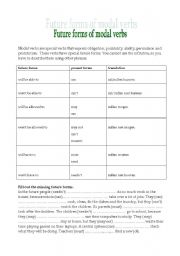

May he come to your party? No, he must not. When you use other tenses you have to replace them. You can only use them with the present tense. Modal verbs don't have a past form (except can) and a past participle (3 rd form). The most common modal verbs are can, may and must. We also use them to make requests and offers. They have never met.Modal verbs are types of auxiliary verbs which express necessity, ability, permission or possibility.

Might is less formal than may, and is more common in conversation Where are my keys? They might be in the car.Side effects of this medication may include upset stomach and fever.

May is formal and is often found in writing, like this example: Present: Where are my keys? They may be in the car.May shows possibility in the present or the future. You can find links to the exercises at the bottom of the page. This modal verbs for possibility lesson shows you how to use them all correctly in English. Several modal verbs show possibility, including might, may, could, and must.


 0 kommentar(er)
0 kommentar(er)
